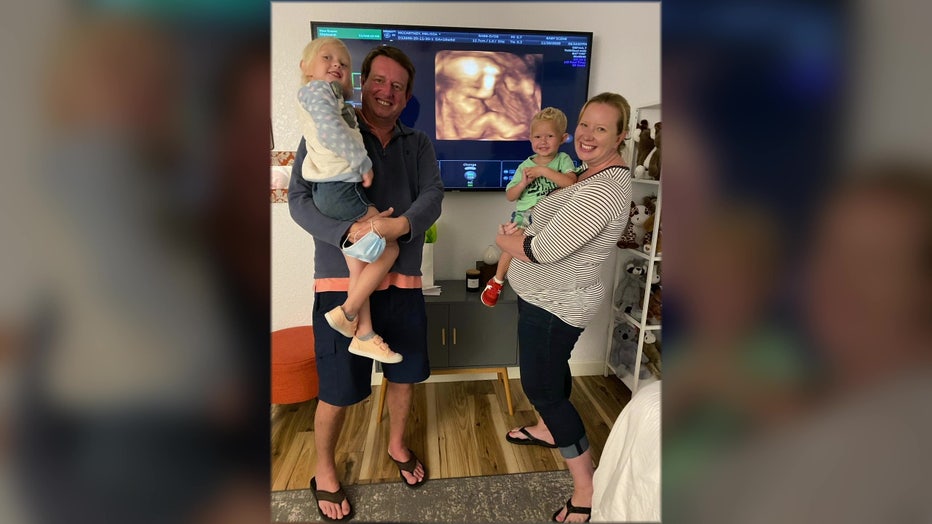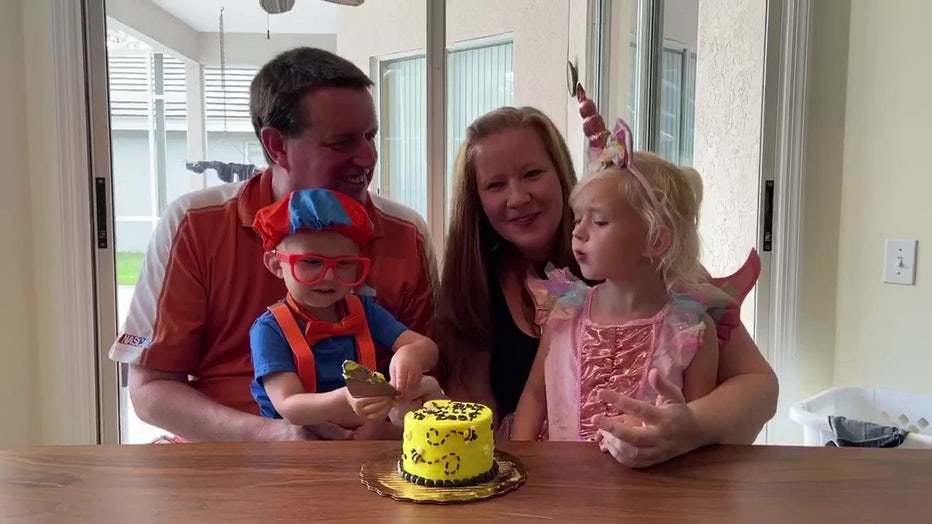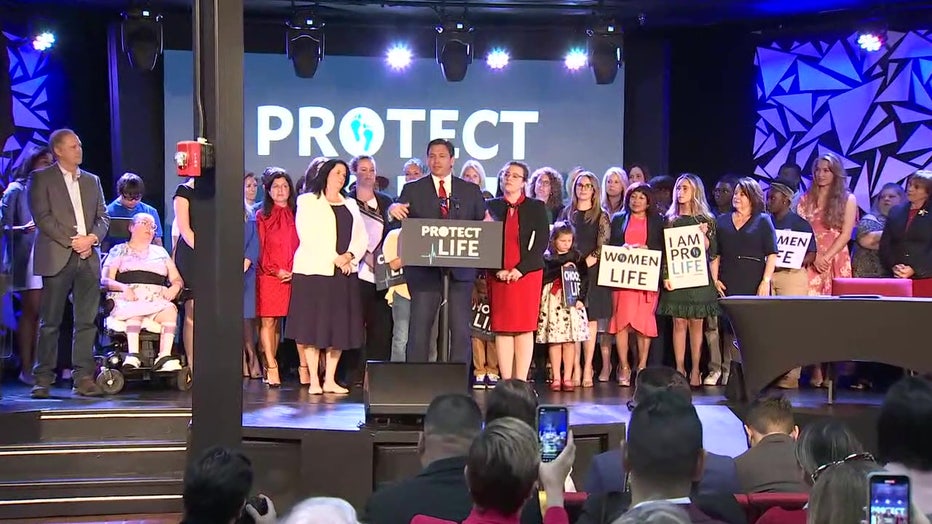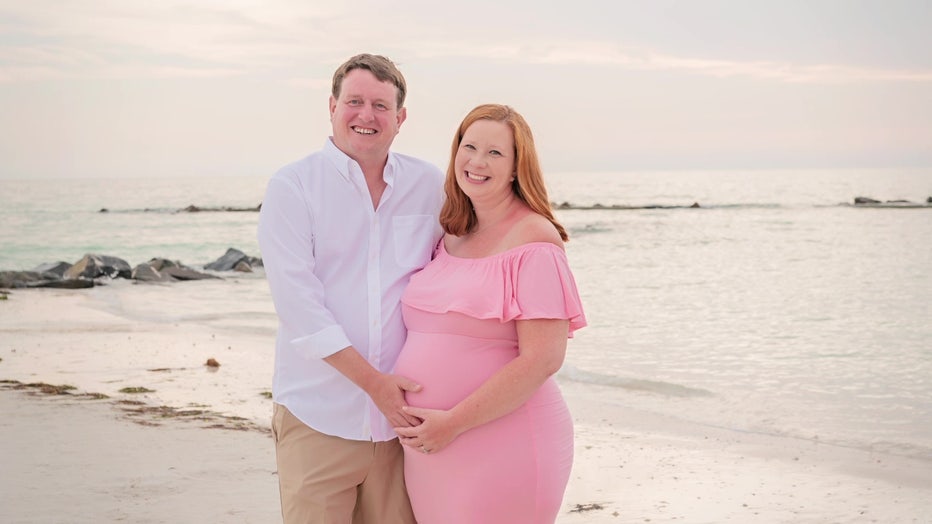Despite lethal diagnoses, Florida abortion law blocks families from termination
State abortion law forces families to make tough call
The Florida legislature appears poised to pass even tighter restrictions on access to abortion. A bill to restrict nearly all abortions after six weeks is expected to come to a vote in the Senate Thursday. A couple who lost their baby during labor after a Trisomy 18 diagnosis worry lawmakers have not considered how the law will affect families already thrust into the most difficult time of their lives.
TAMPA, Fla. - Women and families in Florida who have faced terminal diagnoses for unborn children know the decision to terminate a pregnancy is gut-wrenching. Some now face even more hurdles as Florida shrinks the length of time they have to make an informed decision.
A Bay Area couple who was ready to welcome their baby girl to the world before receiving devastating test results shared their experience with FOX 13.
Melissa and James McCartney remember the joy they felt when they heard their daughter’s heartbeat for the first time.
"We were actually pretty excited, because we’d had five miscarriages prior to her," recalled Melissa.
Their elation, however, proved fleeting. In her excitement, Melissa hadn’t noticed the ultrasound technician go quiet and quickly exit the room. Moments later, their doctor entered.
RELATED: Florida Senate ready to take up 6-week abortion limit
"I’m like ‘Oh, there’s a heartbeat! This is exciting. That’s great!’ And then she comes back in and says that there are several markers on our ultrasound," said Melissa.
Her doctors suspected Melissa’s 12-week Nuchal Translucency (NT) scan showed early indications of a chromosomal abnormality. Further testing would reveal their baby had a genetic condition called Trisomy 18, a disease that affected every cell in her tiny body.
Their prognosis was grim.
"We talked about termination, because our doctors said that she was unlikely to survive up to birth, and if she did survive birth, she would probably only live a couple hours, maybe only a couple of days," said Melissa. "They couldn’t guarantee she could breathe on her own, and they couldn’t guarantee that her heart could survive labor."
RELATED: Florida Senate ready to take up 6-week abortion limit
The McCartney's wanted more information before making a decision on whether to continue the pregnancy.
"We wanted to get more testing done. We wanted to do the fetal echo and see how bad everything was for her and get some more information, because at that point you’re getting a diagnosis and you’re reading a lot about how devastating the diagnosis is and how most babies don’t survive, but we wanted more concrete information about what her issues were," Melissa explained.
Those tests took several more weeks. Melissa’s doctors informed them that based on Florida law at that time, she would have up until 23 weeks gestation to make a decision on termination.
Even with a 23-week window, the McCartney's felt they didn’t have enough time to make a choice.
Previous: First hearing for 6-week abortion limit bill
After lawmakers passed a 15-week limit last year, the Florida House on Thursday started moving forward with a proposal that would prevent abortions after six weeks of pregnancy.
"It’s a very short window of time to make a good decision, to think everything through and weigh every option, and every different way of thinking about it that you can," said James.
Melissa says she felt her doctors and medical specialists at Tampa General Hospital made every effort to schedule additional testing as quickly as possible, in order to give them as much information and time as they could, given the circumstances.
"She was a very much wanted baby, and it was comforting for us to know that if one of the ultrasounds didn’t go well, or if one of the fetal heart echoes showed that her issues are more extensive, that we could’ve chosen to say, ‘This is enough. It’s time to let her go.’ That did bring us a lot of comfort in those days when there was so much uncertainty," said Melissa. "We were grateful we had the time to think about that and consider it because nobody does that lightly."
PREVIOUS: State lawmakers expected to put 6-week abortion ban on legislative fast-track
Because babies with Trisomy 18 can sometimes survive birth, it is medically referred to as a condition that is incompatible with life, but not declared fatal in absolute terms.
After counseling from their medical staff, researching their diagnosis, and joining several Trisomy support groups for parents like them, Melissa and James decided to continue their pregnancy.

The McCartney's named their daughter Evie and celebrated her arrival with friends and family. On weekends, they decorated Evie’s nursery. Weekdays, in between nursing classes, the couple bounced between multiple appointments each week.
While they planned for her arrival, they also had to prepare themselves, and their other children, for a more somber outcome.
"We had a 5-year-old and a 3-year-old at the time and that was really difficult trying to explain. ‘Hey you have a little sister, but she may not get to come home,’" recalled Melissa.
Adding to that, Melissa and James were also required to fill out an advanced directive before she gave birth.
MORE: 'We won't go back': Abortion rights activists rally 50 years after Roe
"That’s so, so hard. ‘Do you want your child to have resuscitation at birth? Or if she’s going to go do you just want to give her comfort measures?' ‘What do you want to do after that point if she survives birth?’ ‘What are your options then?’ And then, ‘if she’s not born, you have to plan for a funeral.’
Related: Lawmakers consider 6-week abortion ban in Florida
The state’s timeline for abortions took a nosedive in last two years, going from allowing up to 24 weeks for the procedure down to 15 weeks in 2022. Now there’s a move to narrow the scope even further to six weeks.
"You have gifts that people have given you that you have to do something with when you come home from the hospital," said Melissa. "I was really grateful that my sister was here, and she was able to remove a lot of that from her space, so we didn’t have to see the visual reminder that our daughter wasn’t here with us."
On April 8, 2021, Evie Joyce McCartney died while Melissa was in labor.
"We knew from her tests that her heart had several holes in it, which makes it very weak," said Melissa. "Going through labor and delivery was not going to be an easy process for her, and it turns out that she did not survive labor. She was alive when we went to be induced, and she did not come through birth alive."
A year later, the McCartney’s were pregnant again. This time, with a healthy baby girl.
"It was such a relief to know that we were not going to have to go through that again, because if her testing had come back the same as with Evie, we would’ve definitely would have chosen to terminate. We couldn’t have gone through that again," said Melissa.
PREVIOUS: Indiana doctor who provided abortion drugs to 10-year-old rape victim defends actions in court
But by then, the McCartney’s may not have had the option to terminate.
In 2022, and nearly a year to the day after Evie was born stillborn, Governor Ron DeSantis signed a law restricting abortion access to 15 weeks of pregnancy, with few exceptions.
"We were lucky that we were able to go in for the NT scan at 12 weeks, because I was advanced maternal age," Melissa said. "A lot of moms don’t have that at 12 weeks in, so they wouldn’t know about a life-limiting diagnosis until 18 or 20 weeks and by then it’s way too late to make any of their decisions. They’re stuck carrying a child that may not survive and may be in pain."
In order to qualify for termination after 15 weeks, two doctors must certify a fatal condition. Melissa, who is also a labor and delivery nurse, says from what she’s witnessed, few are willing to officially call a condition fatal if a heartbeat is still present.
"It shouldn’t ever have to be a choice that a doctor has to make between doing what is best for their patient, and jeopardizing their license and their livelihood," said Melissa.

"We’ve had patients who have come in because their water broke, and they aren’t even halfway through their pregnancy, and they find out and there’s nothing we can do, because it’s after the time period where they are allowed to do anything. There’s nothing that we can really do for most moms besides, just wait until the baby doesn’t have a heartbeat anymore. That can take weeks. Your baby cannot survive at 16 weeks without water in utero, but you can’t do anything about it here."
READ: Abortion rights groups submit 2023 fall ballot measure in Ohio
Though Florida’s current law allows exemptions in cases of "fatal fetal abnormalities", there is no exception for women experiencing a complicated pregnancy, like Melissa’s, where there is still a chance that the child might survive birth.
"Ninety-percent don’t make it to survive to birth and 90% don’t make it to survive a year. So is that one-percent enough to put all the Trisomy-18 babies into one category, because that one baby was able to survive for a year? I’m not the lawmaker, but that doesn’t seem to be a reasonable way to think about it," said James. "To me, it’s actually worse than arbitrary. It’s cruel."
Melissa says she’s seen many families elect to abort at the earliest signs of a problem, because the current timeline does not allow for further testing.
"It’s something that doesn’t have to be. Giving people the time to make that choice, to make a good choice, rather than one that has to be made on a split second because of the timeline, that would be devastating to me," said James.

And now the Florida legislature appears poised to pass even tighter restrictions on access to abortion. A bill to restrict nearly all abortions after six weeks is expected to come to a vote in the Senate Thursday.
Melissa and James worry lawmakers have not considered how the law will affect families who’ve already been thrust into the most difficult time of their lives.
"We had a six-week ultrasound with Evie and you couldn’t even see a heartbeat then, so that’s no time. It’s no time to make any sort of informed decision. I think this law backs people into a corner," said Melissa.
MORE: Male contraception showed promise in study

"Choosing to bring a baby that has such a life altering diagnosis to term is not something that you do lightly, and it’s not something you can just say ‘oh it’ll be okay.’ We were not okay for a really long time after that."
The McCartney’s say losing Evie affected their entire family. Their older children still ask about her.
"I would actually say you never get over it. You never, ever get over it," said James.

